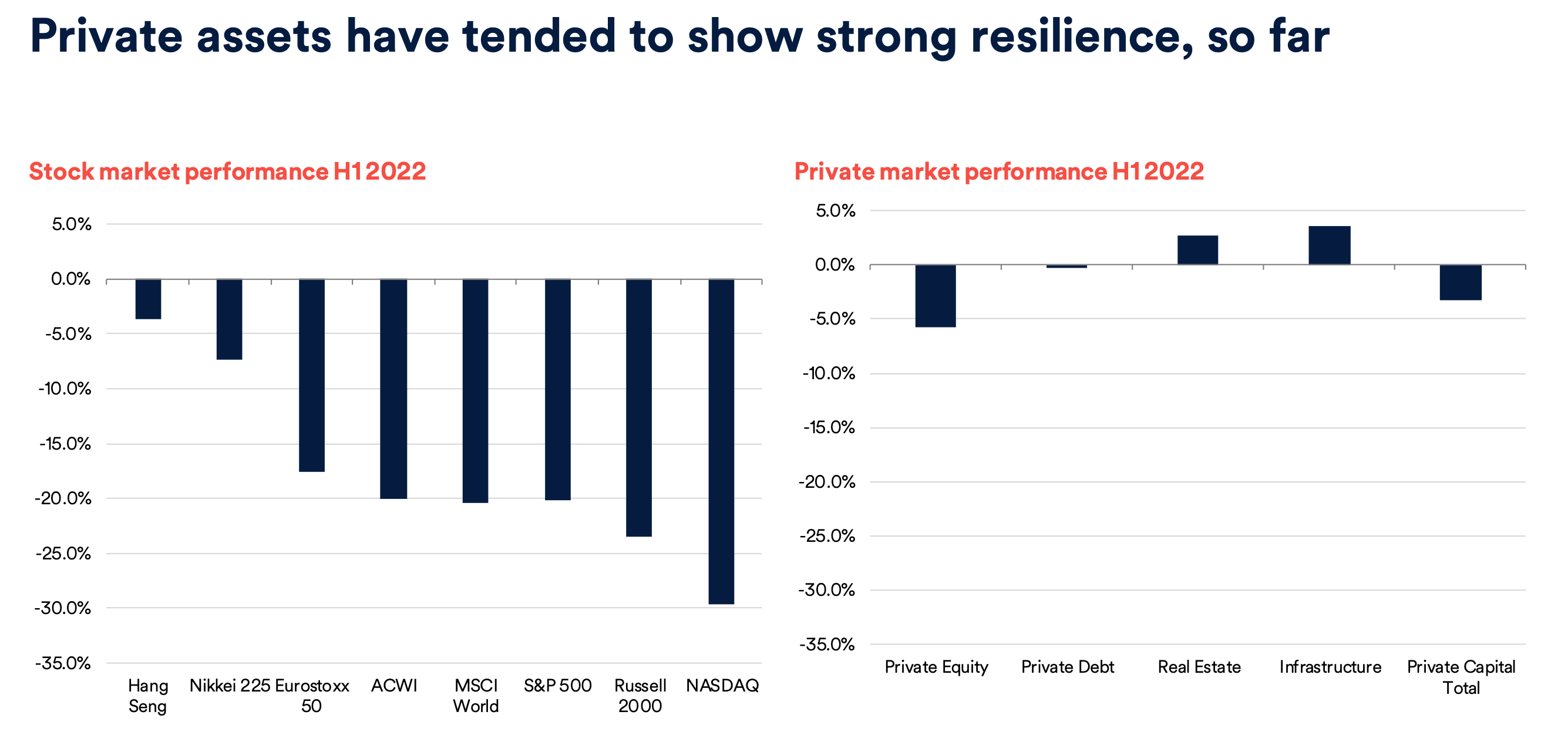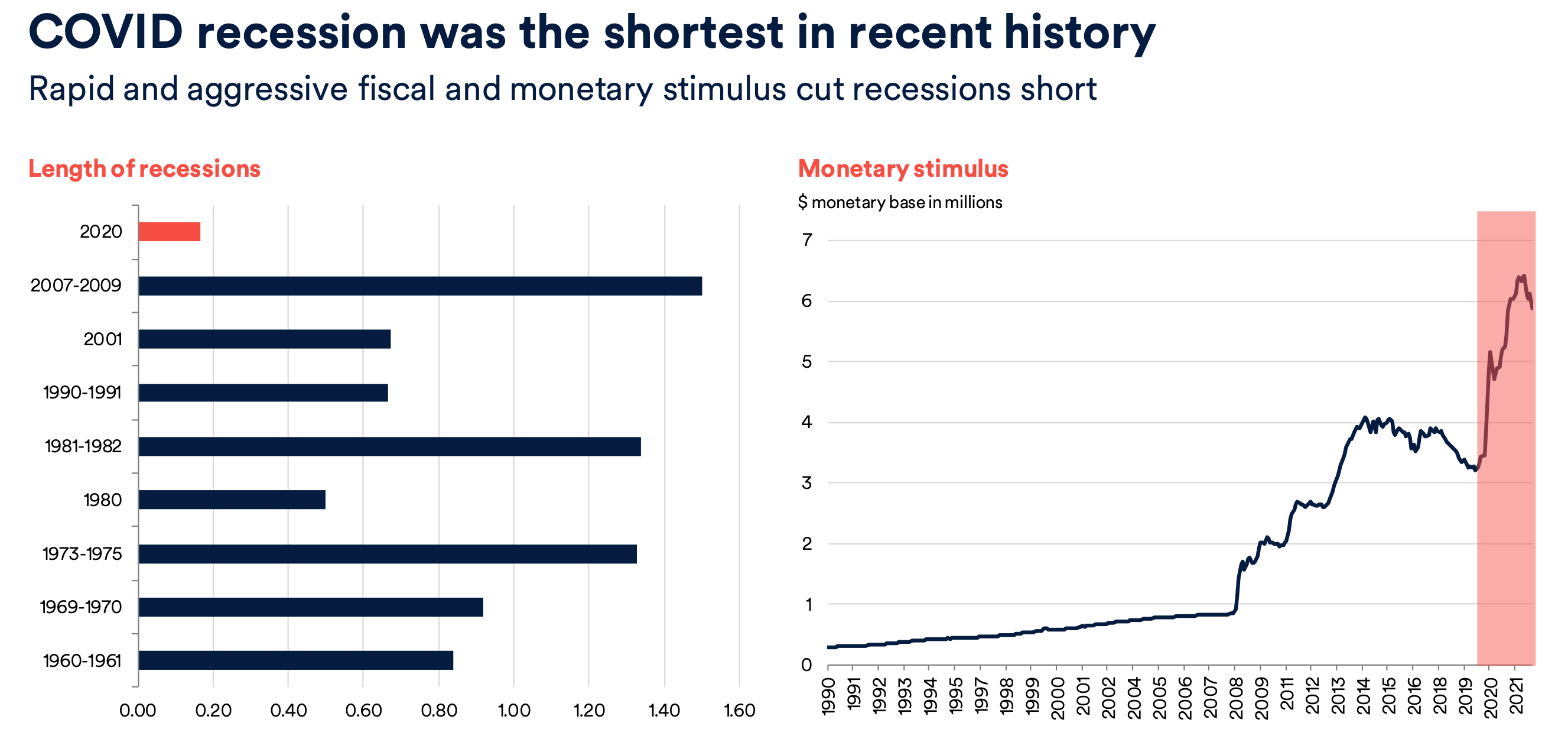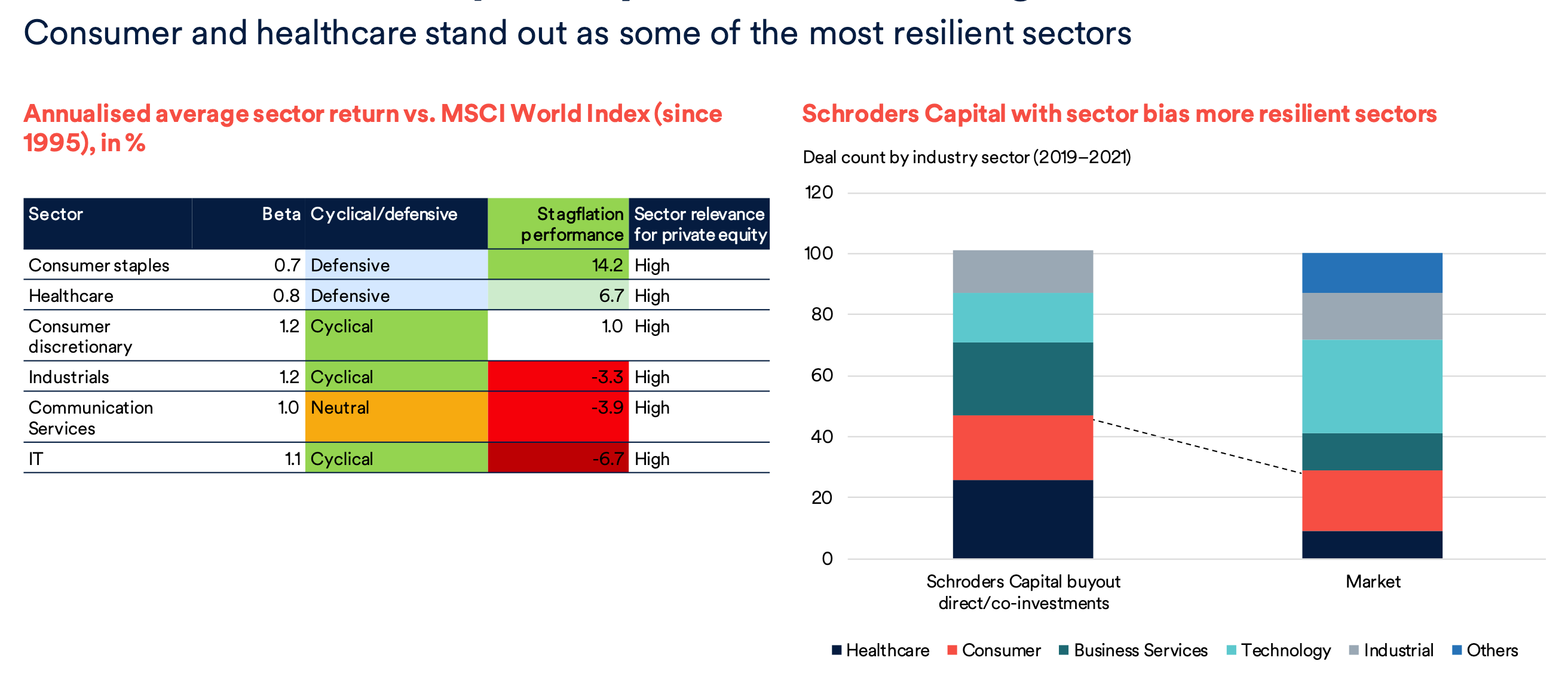Another way to dodge the drama of equities and bond markets
Financial markets have been heavily distorted in the last couple of years. Early in 2020, we saw the shortest recession in recorded history, which closely followed the end of the longest-ever equity market bull run. The reaction to the former – massive fiscal stimulus – is what brought the downturn to a rapid end and has in turn led to the high inflation we see currently.
As shown in the chart below, this has caused equity markets to drop more than 30%. But private markets have proven far more resilient, falling just over 5% during this period.

The trillions of dollars governments poured into economies created various bubbles, as mentioned by Schroders' Claire Smith in a recent webinar.
“Things like the ‘stay at home’ bubble, with everyone piling into companies like Peloton, which is now 96% off its peak,” she says.
Bubbles also formed around special purpose acquisition companies (SPACs), which are off 63%, and cryptocurrency, where Bitcoin has fallen around 70% in 12 months.
“Markets are still grappling with the impact of that cheap monetary policy. I think a lot of people are wondering what are fair prices (for assets) and are market corrections finished,” Smith says.

Source: St. Louis Fed (FRED), NBER, Schroders Capital, 2022. Past performance is not a guide to future performance and may not be repeated. Recession length based on NBER methodology.
What is (and isn’t) private equity?
The Schroders team focuses on finding good companies where efficiencies can be built to drive more value. Up to 70% of the companies the Schroder Specialist Private Equity Fund buys are family-owned businesses, which Smith regards as a fertile hunting ground.
“Sometimes, people think private equity is all about borrowing a bunch of money, buying a company, and then trying to flip it. But that’s the antithesis of our philosophy,” Smith says.
“You find a company with great credibility in its market, but which hasn’t had that fresh set of eyes before – we can automate this, we can improve that. They’re the types of companies we like, where we can drive growth and change to help them grow into a bigger company.”
Is there more to come?
Without providing a definitive answer – because no one really knows – Smith suggests private equity can provide a way to mitigate the risk within individual portfolios. She emphasises the portfolio’s ongoing emphasis on the defensive sectors of healthcare and consumer staples given the outlook for a recession or “stagflation.” (This term refers to a period characterised by economic stagnation and high inflation – perhaps best demonstrated during the US recessions in the mid-1970s and early 1980s.)

Source: Preqin, Schroders, Schroders Capital, 2022. Past performance is not a guide to future performance and may not be repeated.
The big themes
Smith and her team have looked back over historical economic data and found these defensives are typically among the best performers during such periods.
For healthcare, this is underpinned by ageing populations while in consumer staples, this has been driven by a rotation out of consumer cyclicals (companies that rely heavily on the business cycle and economic conditions).
In consumer staples, Schroders is focused on the Western world's opportunities but has more of a consumer discretionary sector slant in Asian markets, which have different demographic trends.
“On the flip side, technology hasn’t performed as well during a stagflationary environment, but in our tech portfolio, we’ve positioned towards companies in software-as-a-service and cybersecurity,” Smith says.
She believes the demand for such firms – particularly those in the small and mid-cap end of the market cap spectrum – is more resilient than other areas in the space.
Schroders also favours more mature, profit-making technology firms and is currently underexposed to US tech companies. The team’s global investment committee might look at a company in the US trading at 18 times earnings, but also another in Europe, that does the same thing and has just as good an outlook but is only priced at 12 times earnings.
“With tech, you need to really know the business model, question its profitability and the price you’re paying for it. Because it doesn’t matter how profitable the company becomes, if you overpay, you’re not going to recoup the returns you want,” Smith says.
On the other side of the transaction, after a company has achieved its milestones, Smith and her team typically exit by selling the asset to another private equity firm, or possibly see the business sold to another corporation.
“Only around 10% of our positions are exited through IPO,” she says, pointing out this is one of the advantages of participating mainly in the small to medium-sized end of the market.
The German company that delivered a six-fold return
Smith also walked the audience through a couple of companies the Fund has successfully exited recently. INIT, a German consulting firm specialising in the IT sector, counts the German government as a key client across several contracts, with around 30% of these deals inked with INIT.
Government contracts are very “sticky” (they tend to be solid agreements with long duration) and quite remunerative. The consulting firm has also subsequently picked up other German government contracts, for example, being nominated as the software provider supporting passport activation.
From €9 million in EBITDA when the company was brought into the Fund, it hit Schroders’ €12 million target and then exceeded expectations to achieve €25 billion of EBITDA. The subsequent exit of the business saw the team reap a return of around six times the original purchase price.

Access a new way to generate returns
The Schroder Specialist Private Equity Fund helps investors with a suitable risk tolerance achieve potentially higher returns and greater portfolio diversification by accessing the often hard-to-reach global private equity markets. To learn more, please visit their website.
4 topics
1 fund mentioned
2 contributors mentioned

